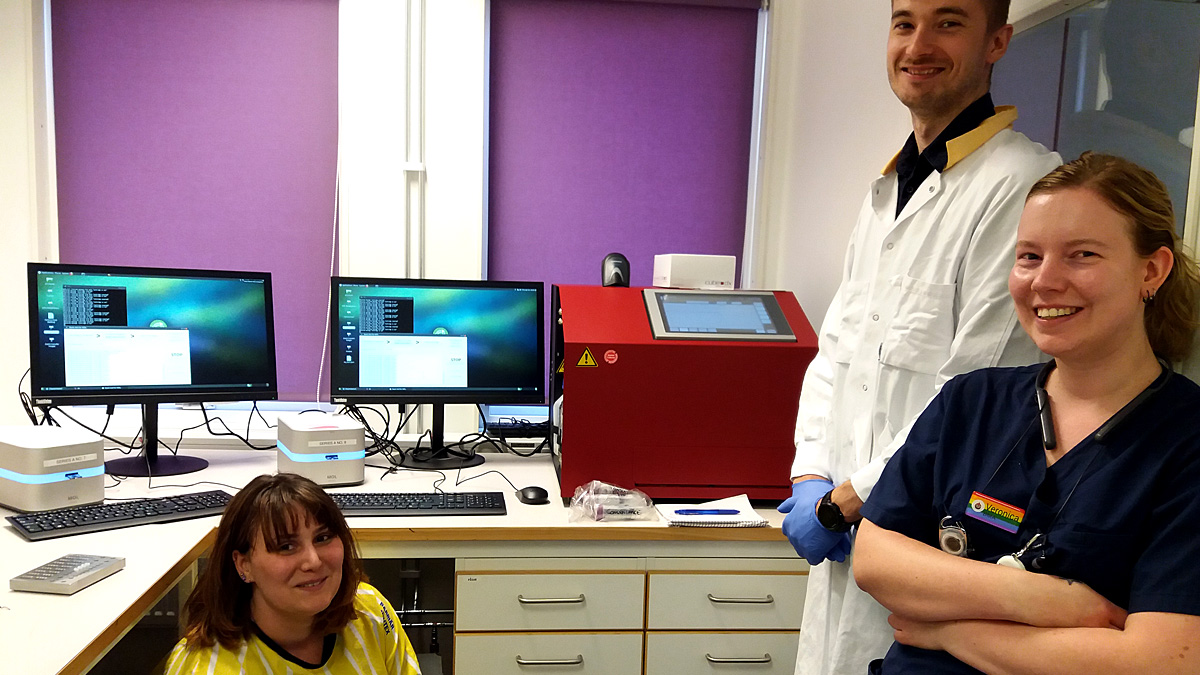Pressmeddelande
24 June 2020
SMARTDIAGNOS - Nya diagnostiska verktyg för att diagnostisera patogener tidigt
De senaste 4 åren har Unilabs Sverige, genom det molekylärbiologiska laboratoriet i Skövde, deltagit i ett EU-finansierat projekt kallat SMARTDIAGNOS. Tio akademiska och industriella partners arbetade tillsammans i konsortiet. Fokus för SMARTDIAGNOS-projektet har varit att använda ny teknologi för att utveckla och testa två nya diagnostiska system för detektion av mikroorganismer direkt i blod från svårt sjuka patienter. Ett diagnostiskt system var avsett för patientnära analyser (PNA), det andra för större laboratorier. System som detta behövs över hela världen för att minska tiden till diagnos vid sepsis och därmed rädda liv.
Helena Enroth, Med Dr, Adjungerad Professor, Högskolan i Skövde helena.enroth@unilabs.com
Fighting sepsis, the most deadly infectious disease:
Horizon2020 project SMARTDIAGNOS delivers new diagnostic tools to diagnose pathogens early
The current pandemic of the new Corona virus (SARS-Cov-2) highlights the dangers of infections and demonstrates the need for fast and reliable diagnostic tools. However, even before the Corona pandemic a more deadly threat was and is largely neglected: sepsis.
Sepsis causes more than 8 million deaths annually and is caused mainly by bacteria. The ongoing spread of antibiotic resistance puts even more pressure on the health systems. Crucial for survival and quick recovery is an early diagnosis of the causative pathogen and its possible drug resistances.
The EU funded SMARTDIAGNOS consortium coordinated by the Danish Technical University (DTU) and constituting of 10 partners from five different EU countries has developed new diagnostic technologies to detect sepsis causing pathogens in blood without the need for microbiological culturing. The test reduces time to result from average 48 hours down to 3 hours and has the potential to reduce mortality and cost.
The progression of sepsis - or blood poisoning - is very quick. A person's condition can become life threatening in just a few hours. The incidence of sepsis is on the rise and is driven by an aging population, advances in medicine and the antibiotic crisis.
Clinicians still struggle with diagnosing sepsis early. Only an early diagnosis allows for early targeted treatment and hence reducing high mortality, a number of complications and significant costs. Today, blood culture is the method used to diagnose the causative pathogen, and it normally takes around 48 hours to get the results.
To overcome this limitation researchers in molecular biology and nanotechnology have teamed up with diagnostic SMEs, clinical microbiologists and business accelerators to form the EU HORIZON2020 SMARTDIAGNOS project consortium (www.smartdiagnos.eu). Aim of the project was to develop new systems to diagnose a wide range of pathogens (bacteria and fungi) and resistance mechanisms in whole blood in just 3 hours.
The 4 years project was recently concluded with a clinical performance evaluation in three hospitals (partners of SMARTDIAGNOS consortium) across Europe.
Clinical evaluation and market approval
As part of the market approval process in Europe, diagnostic tests have to undergo a performance evaluation. To prepare for that ultimate step, the developed tests had have been used in a pilot study performed at the Department of Clinical Microbiology, Unilabs AB, Skaraborg Hospital in Skövde (Sweden) in during the first half of 2019. The purpose of this pilot study was to identify potential improvements for the newly developed instruments and to test the study protocols.
The major performance evaluation was performed in the second half of 2019 and the beginning of 2020 at the laboratories of the three clinical consortium partners Unilabs AB (Sweden), the Charles University in Prague (Czech Republic) and Danube University Krems (Austria). Besides the determination of technical features like analytical sensitivity and specificity, the testing of patient samples and comparison with the current gold standard blood culturing and identification by MALDI-TOF were performed.
In total, 403 patient blood samples were analyzed and compared to blood culture as reference. In conclusion, Cube Dx’ instrument and test developed within SMARTDIAGNOS enabled to detect and identify pathogens directly from blood within 2-4 hours, whereas existing gold standard methods usually took between 48-120 hours before results were obtained. Sensitivity was around 70% and specificity 99%. In total, 96% of the samples were correctly classified.
So, even after the end of SMARTDIAGNOS the Cube Dx system continues to operate within the clinical laboratory routine in two out of the three laboratories participating in the performance evaluation and helping patients and physicians in their fight against real infections and sepsis.
More information about SMARTDIAGNOS:
www.youtube.com/watch?v=i6U1ttdiJG0&feature=youtu.be
www.smartdiagnos.eu
Inquiries: Cube Dx GmbH | Christoph Reschreiter reschreiter@cubedx.com | Mobile: +43 676 3502931
The project SMARTDIAGNOS has received funding from the European Union's Horizon 2020 research and innovation programme under grant agreement No 687697.

Project partners
Technical University of Denmark (DTU) - Nanotech & National Food Institute, Copenhagen Business School, Cube Dx GmbH, Danube University Krems, Deutsches Institut für Normung e. V., University of Skövde, TATAA Biocenter, Unilabs AB, Zoetis
